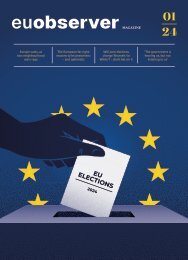European Parliament Elections 2019
It is difficult to acknowledge you don't know something. A few months ago, several thousand Europeans were asked hundreds of questions for the Eurobarometer poll. One of those questions was: "Do you agree with the statement: 'I understand how the EU works'." Only 10 percent totally disagreed with that statement. Another 29 percent "tended to disagree". Peculiarly, three percent said they did not know whether to agree or disagree.
It is difficult to acknowledge you don't know something. A few months ago, several thousand Europeans were asked hundreds of questions for the Eurobarometer poll. One of those questions was: "Do you agree with the statement: 'I understand how the EU works'." Only 10 percent
totally disagreed with that statement. Another 29 percent "tended to disagree". Peculiarly, three percent said they did not know whether to agree or disagree.
You also want an ePaper? Increase the reach of your titles
YUMPU automatically turns print PDFs into web optimized ePapers that Google loves.
Bulgarians that Russia did not try to poison Sergei<br />
Skripal, a former spy, in the UK last year - despite a<br />
wealth of evidence to the contrary.<br />
False Russian stories have also included one that<br />
Ukrainian soldiers crucified a boy in east Ukraine - a<br />
fiction later cited by Russian fighters as a motive for<br />
going to war there.<br />
"When you go murdering people quoting disinformation<br />
messages as your motivation, it's pretty hard to deny<br />
that Russian propaganda has an impact," the Atlantic<br />
Council's Kalensky said.<br />
The concerns on Russian interference come in an<br />
environment where votes were being decided by<br />
race, it would become a force to be reckoned with.<br />
If it pulled together 200 MEPs in ad-hoc coalitions on<br />
divisive policies, such as migration, "it would be very,<br />
very hard to get things done without them," according<br />
to Votewatch, a think tank in Brussels.<br />
But those numbers were "not very likely, given the<br />
diverse positions of right-wing nationalist parties" in<br />
Europe, Votewatch said.<br />
For its part, the EU foreign service in Brussels is<br />
staffing up its East Stratcom office, set up to counter<br />
media propaganda, from 14 to 18 people and boosting<br />
its budget from €1.1m to €3m "specifically to address<br />
Russian disinformation", an EU official said.<br />
Civil society groups, such as Ilga-Europe, have also<br />
launched debunking and hate-monitoring projects.<br />
That might not sound like much, but transparency can<br />
be powerful, Snyder, the US historian, noted.<br />
"What's important is framing - if people are asked: 'Do<br />
you want lies or do you want the truth?', they generally<br />
say: 'Gosh, I'd like the truth'," Snyder said, referring to<br />
stories that were red-flagged as Russian or far-right<br />
lies.<br />
Pro-EU forces also had a compelling story, if they told it<br />
right, Snyder added.<br />
"The current <strong>European</strong> story is: 'We stopped bad things<br />
from happening 70 years ago', and Europe needs<br />
another story," he said, referring to the EU's post-WW2<br />
origins.<br />
Everybody could relate to Adrian Coman (l) because he was 'just<br />
another Romanian trying to make a better life for himself abroad',<br />
Teodora Ion-Rotaru, from Accept, an LGBTI rights group in<br />
Bucharest, said<br />
Photo: acceptromania.ro<br />
narrow margins, he added.<br />
Recalling recent Austrian and Czech elections and the<br />
Brexit referendum, "to swing these votes, you would<br />
need just two or three percent, Kalensky said.<br />
Propaganda's "impact may be marginal, but even a<br />
marginal change can, in a tight race, make a difference,"<br />
the Atlantic Council's Nimmo added, in his recent study<br />
on Russia's meddling in the 2016 US election.<br />
TIGHT RACE<br />
If Salvini's group got 140 out of 701 seats in the EU<br />
"The way the EU wins is by saying our protection of<br />
human rights, including gay rights, is part of a larger<br />
style of life which people find enviable," Snyder said.<br />
"Things young people care about - like labour mobility,<br />
digital privacy, global warming - these are things the<br />
<strong>European</strong> Union is doing the best job in the world of<br />
dealing with," he said.<br />
LOVE STORY<br />
The appeal of the <strong>European</strong> romance came to light in<br />
a recent referendum on banning same-sex marriage in<br />
Romania.<br />
Romanian voters last October faced an onslaught of<br />
homophobic propaganda by state and oligarch-owned<br />
media, far-right groups, and shady NGOs.<br />
Russian media and social media also pushed 'Gay-<br />
30 — EUROPEAN PARLIAMANT ELECTIONS <strong>2019</strong>

















